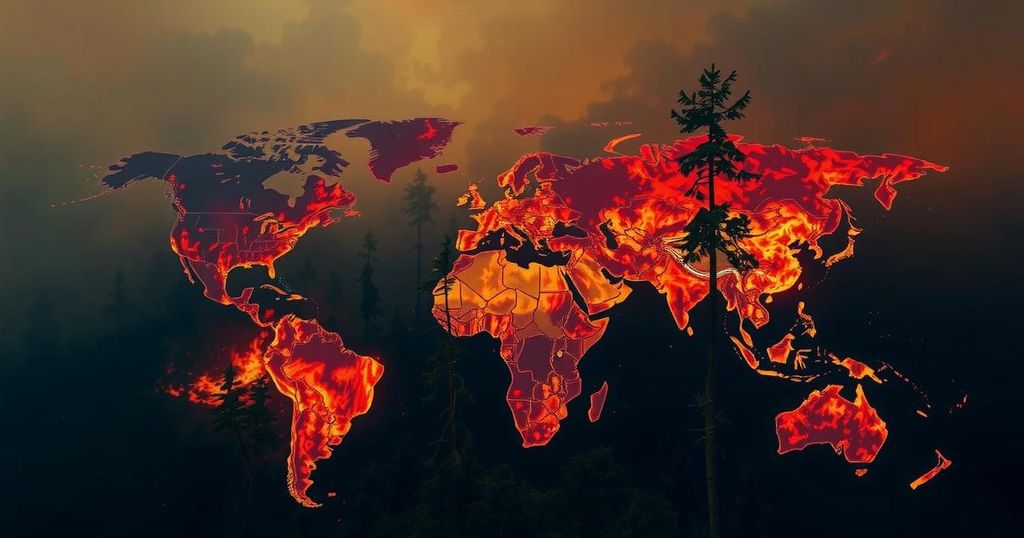Climate Change and the Alarming Rise of Wildfires: A Comprehensive Study on Global Trends and Health Impacts
Research highlights a critical link between climate change and the increasing frequency and severity of wildfires, resulting in a rise in smoke-related deaths. While certain regions, particularly in Africa, have seen a decrease in wildfire activity due to human interventions, forested areas are experiencing the opposite. The findings emphasize the importance of addressing climate change to mitigate health risks associated with wildfires.
Recent research establishes a clear correlation between climate change and the escalating frequency and severity of wildfires on a global scale, alongside a significant rise in smoke-related fatalities over recent decades. Researchers from Dalhousie University, Belgium, the UK, and Japan produced two pivotal studies examining the scope of wildfires and their repercussions on public health, revealing grim trends for both. It is estimated that the number of annual deaths attributed to wildfire smoke escalated from under 669 in the 1960s to approximately 12,566 in the 2010s. One study, featured in the journal Nature Climate Change, contrasted wildfire models that incorporate climate change impacts with those that do not, unearthing a notable uptick in wildfire occurrence and intensity in several regions, particularly among vulnerable ecosystems such as the African savannas, Australia, and Siberia. Notably, findings indicate marked regional variations; in Africa, for instance, there has been a significant drop in wildfires, attributed to intensified human activity and land fragmentation that restrict fire spread. In contrast, forested regions such as California and Siberia are grappling with increasing fire incidents due to prolonged droughts and elevated temperatures resulting from climate change. Dr. Sian Kou-Giesbrecht from Dalhousie’s Department of Earth and Environmental Sciences emphasized the importance of these findings, stating, “The study is important because it shows and quantifies the influence of climate change on increasing wildfires worldwide, especially given the impacts of wildfire on society and its feedback to climate change.” The research utilized models accounting for numerous factors, including climate, vegetation, and population density, highlighting that while human interventions such as fire suppression can mitigate fire spread, they often fall short against the overarching influence of climate change, especially during periods of extreme weather. Dr. Kou-Giesbrecht further explained, “What is striking is that in periods with low to moderate numbers of fires, direct human interventions have a large effect. However, in periods with many fires, the effect of climate change dominates, meaning that in these cases we lose control.” The research concluded that from 2003 to 2019, climate change contributed to nearly a 16 percent increase in global burned areas and heightened the chances of experiencing above-average global burned areas by 22 percent. Central Australia witnessed the most pronounced impact. Additionally, a complementary paper in Nature Climate Change found that climate change has perhaps increased the percentage of smoke-related wildfire fatalities up to tenfold over five decades—a largely unmeasured phenomenon until now. Researchers employed fire-vegetation models paired with a chemical transport model and health risk assessments to quantify global human mortality associated with wildfire smoke between 1960 and 2019. They discovered that climate change was responsible for one to three percent of fire deaths in the 1960s, soaring to nearly 28 percent in the 2010s, particularly impacting South America, Australia, Europe, and boreal forests in Asia. Dr. Kou-Giesbrecht noted the intricacies involved in attributing wildfires to climate change, saying, “It can be tricky to attribute wildfire to climate change because of the complexities of the interactions between fire weather, global change effects on potential fuel, land management and ignitions, but in these international projects we have made a robust attribution of wildfires to climate change using multiple models.” Should the current trajectory of climate change persist, the area affected by wildfires and associated health consequences will likely experience significant growth in the coming decades.
The continuous rise in global wildfires has sparked interest and concern among researchers and policy makers alike, prompting a need to understand the underlying causes and their ramifications on public health and ecosystems. Wildfires present not only immediate dangers in terms of destruction but also long-term health concerns related to the smoke they produce. Observing the trends over the past few decades sheds light on the extent of the issue and urges further action to mitigate the impact of climate change on wildfire dynamics.
In conclusion, the studies presented reveal a definitive link between climate change and the rising global incidences of wildfires, contributing substantially to smoke-related mortalities. The nuanced regional differences in wildfire trends underscore the complexity of the phenomenon, while the alarming statistics associated with mortality driven by wildfire smoke necessitate immediate attention. Effective strategies including drastic reductions in greenhouse gas emissions, alongside informed landscape and fire management practices, will be crucial to stabilize the increasingly severe impacts of wildfires on human health and the environment. The findings call for urgent action to address the escalating crisis fueled by climate change.
Original Source: www.dal.ca




Post Comment